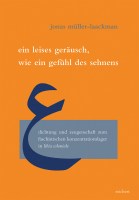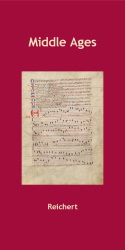Search
Ein leises Geräusch wie ein Gefühl des Sehnens
Dichtung und Zeugenschaft zum faschistischen Konzentrationslager in Libia Coloniale
Short Description
Arabic poetry about the Italian concentration camps in Libia Coloniale is often understood primarily as a historical source, thereby neglecting the poems' literary merits. A Soft Sound, Like a Feeling of Longing approaches these poems from a literary theoretical perspective to revive the narratives of trauma and suffering found in concentration camp literature and the Arabic nomadic poetic tradition and to read them anew within Arabic camp literature.Description
"A soft sound, like a feeling of longing": these are the words a poet uses to describe the sounds of a ship as he and many other deportees are gathered on deck en route to the infamous al-ʿAgīla camp. A portion of the story of the Italian concentration camps in the colony of Libya is told through the poetry about these camps passed down by survivors, which has been archived and partially published in postcolonial Libya.Historical research on these camps often aims to break away from Eurocentric colonial historiography and confront the myth of Italian fascism as more benign. The collected poems play a central role in this revision by representing original Libyan voices that form a counter-narrative against the European perspective. Yet their literary significance as moving narrations of the suffering in concentration camps often remains unrecognized. There is also little reflection on the implications of the potential trauma of being interned, the sometimes unclear chains of transmission, archival practices, and the understanding of these poems as historical descriptions of factual events.
Against the background of theoretical discussions of the phenomenon of the concentration camp, their potential as sites of trauma, and how European camp literature is dealt with in scholarly and literary debates, the author shows the extent to which these Libyan poems represent much more than mere descriptions of facts and how a critical distance to what is reported does not necessarily mean doubting the credibility of the poets. Rather, the poems represent literary works in the tradition of nomadic poetry; they are Arabic camp literature and thus offer subjective descriptions of suffering and the state of exception in the concentration camp.
Rather than interpreting this poetry as a basis for the formation of an anti-colonial nationalist narrative, the author aims to recognize the poetry as a testimony to suffering. Camp literature as a global phenomenon shows how differently trauma and suffering were and still are negotiated. In this respect, poems about Italian concentration camps are impressive testimonies that, embedded in the Arabic nomadic poetic tradition, show the specific ways in which the poets dealt with their experiences. In this way, first-person perceptions of suffering were captured that can be confronted with European colonial historiography and bias.




 Table of Contents
Table of Contents

 Neuerscheinungen 2023/2024
Neuerscheinungen 2023/2024
 Gesamtverzeichnis 2023/2024
Gesamtverzeichnis 2023/2024
 Katalog Oriental Studies & Linguistics
Katalog Oriental Studies & Linguistics
 Mittelalter
Mittelalter
 Deutsche Inschriften
Deutsche Inschriften
 Musiktherapie
Musiktherapie
 Literaturen im Kontext
Literaturen im Kontext